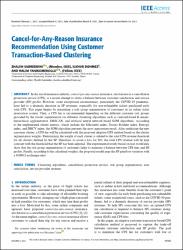| dc.contributor.author | Sadreddini, Zhaleh | en_US |
| dc.contributor.author | Dönmez, İlknur | en_US |
| dc.contributor.author | Yanıkömeroğlu, Halim | en_US |
| dc.date.accessioned | 2021-07-12T09:16:07Z | |
| dc.date.available | 2021-07-12T09:16:07Z | |
| dc.date.issued | 2021 | en_US |
| dc.identifier.citation | Sadreddini, Z., Donmez, I., & Yanikomeroglu, H. (2021). Cancel-for-Any-Reason Insurance Recommendation Using Customer Transaction-Based Clustering. IEEE Access, 9, 39363-39374. | en_US |
| dc.identifier.issn | 2169-3536 | |
| dc.identifier.uri | https://doi.org/10.1109/ACCESS.2021.3064929 | |
| dc.identifier.uri | https://hdl.handle.net/20.500.12294/2777 | |
| dc.description.abstract | In the travel insurance industry, cancel-for-any-reason insurance, also known as a cancellation protection service (CPS), is a recent attempt to strike a balance between customer satisfaction and service provider (SP) profits. However, some exceptional circumstances, particularly the COVID-19 pandemic, have led to a dramatic decrease in SP revenues, especially for non-refundable tickets purchased early with CPS. This paper begins by presenting a risk group segmentation of customers in an online ticket reservation system. Then, a CPS fee is recommended depending on the different customer risk groups provided by the cluster segmentation via different clustering algorithms such as centroid-based K-means, hierarchical agglomerative, DBSCAN, and artificial neural network-based SOM algorithms. According to the implemented cluster metrics, which include the Silhouette index, Davies-Bouldin index, Entropy index, and DBCV index, the SOM algorithm presents the most appropriate result. After predicting the new customer cluster, a CPS fee will be calculated with the proposed adaptive CPS method based on the cluster segmentation weights. Determining the weight of each cluster is related to the total CPS revenue threshold for all clusters defined by the SP. Therefore, to avoid a loss for SPs, the total CPS revenue will be kept constant with the threshold that the SP has been adjusted. The experimental results based on real-world data show that the risk group segmentation of customers helps to maintain a balance between CPS fees and SP profits. Finally, according to the calculated weights, the proposed model pegs the SP gain/loss variation with a 0.00012 exchange ratio. | en_US |
| dc.language.iso | eng | en_US |
| dc.publisher | IEEE-INST Electrical Electronics Engineers Inc | en_US |
| dc.relation.ispartof | IEEE Access | en_US |
| dc.identifier.doi | 10.1109/ACCESS.2021.3064929 | en_US |
| dc.identifier.doi | 10.1109/ACCESS.2021.3064929 | |
| dc.rights | info:eu-repo/semantics/openAccess | en_US |
| dc.rights | Attribution-NoDerivs 3.0 United States | * |
| dc.rights.uri | http://creativecommons.org/licenses/by-nd/3.0/us/ | * |
| dc.subject | Clustering Algorithms | en_US |
| dc.subject | Cancellation Protection Service | en_US |
| dc.subject | Risk Group Segmentation | en_US |
| dc.subject | User Satisfaction | en_US |
| dc.subject | Service Provider Revenue | en_US |
| dc.title | Cancel-for-Any-Reason Insurance Recommendation Using Customer Transaction-Based Clustering | en_US |
| dc.type | article | en_US |
| dc.department | Mühendislik ve Mimarlık Fakültesi, Bilgisayar Mühendisliği Bölümü | en_US |
| dc.identifier.volume | 9 | en_US |
| dc.identifier.startpage | 39363 | en_US |
| dc.identifier.endpage | 39374 | en_US |
| dc.relation.publicationcategory | Makale - Uluslararası Hakemli Dergi - Kurum Öğretim Elemanı | en_US |




















